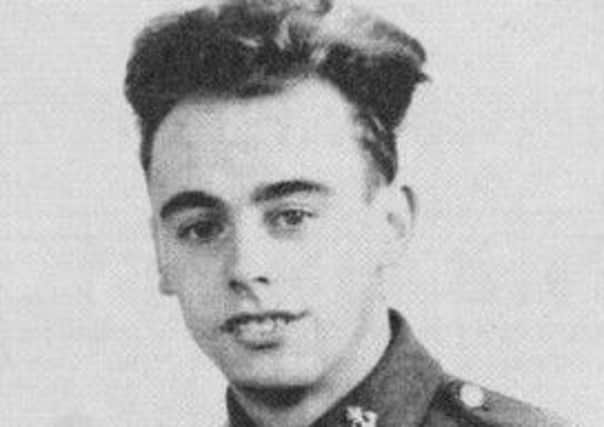Obituary: Ronald Angus Macbeath, headmaster


Ronnie Macbeath, who has died aged 94, was for many years a popular primary school headmaster in the Edinburgh area and one of the last survivors of one of the long marches across Europe undertaken by captured members of the 51st Highland division.
However, what the many school children he taught never knew was that behind his ever cheery avuncular demeanour there lay a complex character whose earlier life had been changed by an extraordinary war service.
Advertisement
Hide AdAdvertisement
Hide AdRonnie Macbeath had been born the son of a shepherd in Kirkhill, in the far north of Scotland. His mother was from Skye, and although not a Gaelic speaker himself, his style was ever that of the innocent Gael, though he could be as cunning as a fox when the need arose and his pupils had to be very smart if they were to pull the wool over Mr Macbeath’s eyes.
As a child at primary school his intelligence was quickly recognised and he won a scholarship to Inverness Royal Academy, where he did well, even though his daily round trip bicycle ride to school was more than 20 miles.
By 1939 he had joined the Territorial Army and at the age of 18 found himself called up only a few days before he was due to start his first job, in Inverness.
The next four years must have been extraordinary for a youngster who had seen little of life outside the Highlands for he was soon in action in France as a field telephone operator whose tasks were primarily to maintain communications between various factions on the battle field, if not through his telephone then through taking messages by hand.
As ever, he treated the challenges with a sometimes evasive self-deprecating good humour, once remarking that his task was relatively easy as a field telephone was lighter to carry than the heavy anti-tank gun that had been his previous charge.
With the British retreat from France he was one of a large number of Highlanders who were captured with the 51st division who were forced to march for more than two weeks across much of France and Belgium before being taken on a cramped coal barges to camps in Germany.
There then followed four difficult years which saw the youngster being transferred from one camp to another and being a support worker in what some see as being the first successful tunnel escape from a Germany PoW camp (Oflag VIIC).
Ronnie would claim that amongst the roles he played in this endeavour was getting rid of some of the soil, hiding it under ash taken from the stove, and the playing of his bagpipes to muffle the sound of the digging.
Advertisement
Hide AdAdvertisement
Hide AdOn one occasion, he and several other selected prisoners where kept in handcuffs, with the rumour mill suggesting that some of them were to be shot as reprisals for the shooting of German PoWs.
In the latter years of the war he even managed to escape after slipping away from his guards while on duties outside the camp, but he was soon recaptured and possibly saved from being arrested as a spy by his prison tag, which he had kept in anticipation of capture.
But it wasn’t all a nightmare and amongst other pursuits he did manage to attend some courses in physics which were to provide an interesting foundation in his later career.
In 1945 he returned to the Highlands and graduated in science from Aberdeen University, before taking a postgraduate qualification in teaching .
In 1952 he married Mairi, a stout-hearted broth of a girl from Skye, and together they worked in a number of demanding developing world locations including Ethiopia, Sudan and Bangladesh.
These were probably his most productive days, when his skills as a self-reliant and resourceful Highlander and rock-solid educationalist were ably used as he helped establish schools in many demanding locations.
The couple were to retain links with some of his former pupils for many years afterwards.
As a teacher his greatest skill was arguably his ability to charm the children into liking this genial, sparkly-eyed character, sometimes with toffees, sometimes with conjuring tricks, always with a smile, but he was also punctilious, sometimes almost to a fault, with his administration.
Advertisement
Hide AdAdvertisement
Hide AdBy then the couple had three children and in the late 1960s they returned to Edinburgh where they bought the boarding house and Ronnie took up his teaching posts so that the children could be educated in Scotland.
His latter appointments were often as headmaster of schools in mining villages near Edinburgh.
Living in Stockbridge’s Danube Street, with its notoriously exotic night life, was often challenging and Ron would love to tell of how the madam of the local bordello would assure him, tongue in cheek, that although business had been bad she could at least rely on the business brought in by the annual General Assembly of the Church of Scotland!
The Danube Street boarding house was primarily run by his long-suffering wife, and she turned it into something of an institution, making it a popular destination for some of the finest actors and actresses in the land and the energetic couple were much celebrated for their Highland craque and hospitality.
In the 1980s they retired to the Highlands where their architect son Iain had bought the mini estate of Kindeace near Invergordon, though they latterly moved to Tain.
Ronnie Macbeath is survived by all his three children; Iain, an architect, Rhona, a teacher, and Mairead, a lawyer whose caring for her father in recent years has does her much credit.
He also leaves three grandchildren and several thousand grateful pupils around the world.
MAXWELL MACLEOD